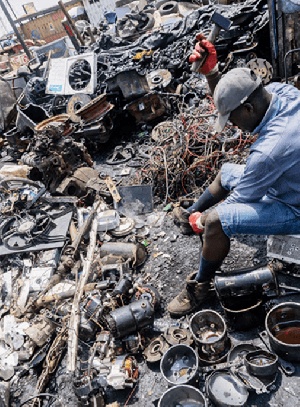
Ghana Moves to Regulate Scrap Metal Industry to Curb Theft, Pollution, and Tax Evasion
A new regulatory framework is in development to bring order to Ghana’s scrap metal industry, aiming to reduce theft, environmental damage, and tax evasion while protecting national infrastructure and public safety.
Officials say the largely informal and unregulated scrap sector poses increasing threats to society. The upcoming licensing policy—currently being crafted by the Ghana Integrated Iron and Steel Development Corporation (GIISDEC), in collaboration with the Ministry of Local Government and the Attorney-General’s Department—will require all actors in the scrap value chain to register. This includes collectors, middlemen, exporters, and buyers.
“The entire industry will be brought under regulation,” said Williams Okofu-Dateh, CEO of GIISDEC. “Operators will need licenses before engaging in any scrap-related activity. Right now, unlicensed players engage in cross-border smuggling, evade taxes, and endanger lives and infrastructure.”
The scrap metal industry plays a vital role in Ghana’s steel manufacturing, as local producers rely heavily on scrap metals to fabricate iron rods and anvil bars—key materials for construction. Due to the absence of commercial iron ore production, scrap serves as the country’s primary steel input.
According to Mr. Okofu-Dateh, scrap-based steelmakers currently supply over 70% of Ghana’s iron rods, underlining the sector’s strategic importance. However, the absence of regulation has allowed theft, tax evasion, and unsafe practices to flourish.
A Sector in the Shadows
Despite its significance, Ghana’s scrap metal trade remains largely informal and undocumented. There is no official data on how much scrap is collected, processed, or exported annually.
“Right now, anyone can show up at a yard and sell scrap—no questions asked,” Mr. Okofu-Dateh said. This lack of accountability has led to widespread theft of public assets such as drain covers, streetlight components, and even machinery parts.
Unregulated scrap trucks frequently pose traffic hazards. Overloaded with sharp metal debris, these vehicles often spill their contents onto roads, endangering other users. Meanwhile, informal methods like burning insulated wires to extract copper contribute to serious air pollution and health risks.
Plugging Loopholes and Protecting the Environment
The new licensing regime aims to formalize the industry for better oversight, improve safety, and enhance environmental protection. GIISDEC highlights that most dealers currently pay only small municipal fees and operate with little to no accountability—resulting in significant tax revenue losses.
The policy will also regulate the export segment of the market. GIISDEC says some dealers illegally export scrap metal through informal channels, depriving local steel manufacturers of vital raw materials. Others import scrap from countries like Côte d’Ivoire without proper documentation or quality checks.
“All domestic and international transactions will have to go through licensed entities,” Mr. Okofu-Dateh emphasized. The goal is to establish traceability and ensure that only vetted, tax-compliant players operate in the space.
What’s Next?
Though the policy is still being finalized, GIISDEC has begun forming a multi-stakeholder committee to shape the implementation process. The agency is optimistic the framework could be operational by year-end, pending legal reviews.
The regulation may also include registration for large-scale fabricators that rely on scrap as a raw material, offering further visibility and coordination across the value chain.
Established in 2019, GIISDEC’s core mandate is to develop an integrated iron and steel industry in Ghana. Regulating the scrap metal trade is a cornerstone of that vision.
“The scrap business underpins our steel industry,” Mr. Okofu-Dateh concluded. “We can no longer afford to leave this critical sector in amateur hands.”





